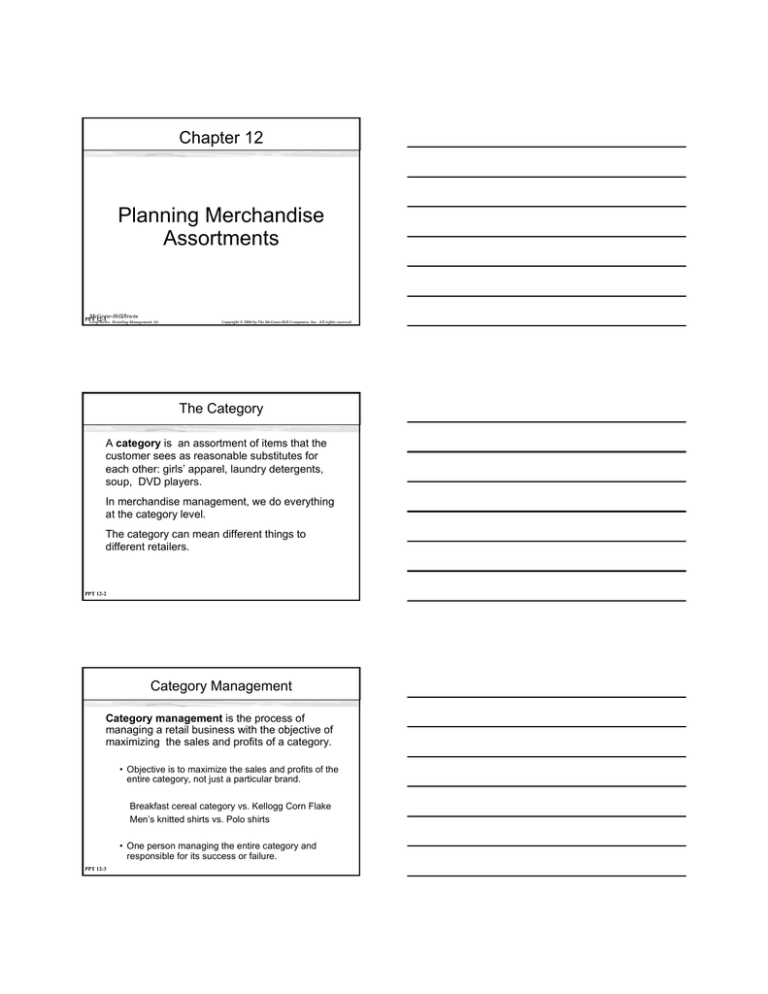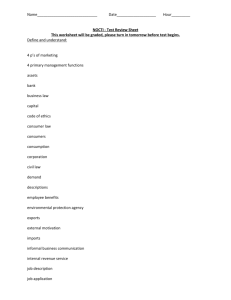
Chapter 12
Planning Merchandise
Assortments
McGraw-Hill/Irwin
PPT
12-1
Levy/Weitz: Retailing Management, 5/e
Copyright © 2004 by The McGraw-Hill Companies, Inc. All rights reserved.
The Category
A category is an assortment of items that the
customer sees as reasonable substitutes for
each other: girls’ apparel, laundry detergents,
soup, DVD players.
In merchandise management, we do everything
at the category level.
The category can mean different things to
different retailers.
PPT 12-2
Category Management
Category management is the process of
managing a retail business with the objective of
maximizing the sales and profits of a category.
• Objective is to maximize the sales and profits of the
entire category, not just a particular brand.
Breakfast cereal category vs. Kellogg Corn Flake
Men’s knitted shirts vs. Polo shirts
• One person managing the entire category and
responsible for its success or failure.
PPT 12-3
Category Captain
Selected vendor responsible for managing
assortment of merchandise in a category
• Vendors frequently have more information and
analytical skills about the category in which
they compete than retailers
• Problems
– Vendor category captain may have different goals
than retailer
PPT 12-4
GMROI
Inventory Productivity Measures
Combine Gross Margin % and Inventory Turnover (sort of)
Gross Margin% Inventory Turn
GMROI
= Gross Margin x Net Sales
Net Sales
Avg Inventory @ cost
GMROI
= Gross Margin
Avg Inventory (@ cost)
Output (Margin Generated by Sales)
Input (Inventory Investment in Inventory)
PPT 12-5
ROI and GMROI
Asset Productivity Measures
Strategic Corporate Level
Return on Assets = Net Profit
Total Assets
Merchandise Management Level
GMROI
PPT 12-6
= Gross Margin
Avg Inventory @ cost
Calculating Inventory Turnover
Inventory turnover =
Net Sales
Average inventory at retail
Inventory turnover =
Cost of goods sold
Average inventory at cost
Average inventory =
Month1 + Month2 + Month 3 +…
Number of months
PPT 12-7
Inventory Turnover and
Sales-to-Stock Ratio
Inventory turnover =
Net Sales
Average inventory at retail
Inventory turnover =
Cost of goods sold
Average inventory at cost
Stock-to-Sales Ratio =
Net Sales
Average cost of inventory
PPT 12-8
Developing a Sales Forecast
• Understanding the nature of the product life
cycle
• Collecting data on sales of product and
comparable products
• Using statistical techniques to project sales
• Work with vendors to coordinate manufacturing
and merchandise delivery with forecasted
demand (CPFR)
PPT 12-9
Data Sources for
Developing Sales Forecasts
• Previous Sales History
• Published Sources - Buying Power Index
(BPI), Monthly Retail Trade Report, InfoScan,
Claritas, general retail trade publications like
Stores, WWD and Chain Store Age
• Customer Information
• Vendors and Resident Buying Offices
PPT 12-10
Factors Affecting Sales Projections
Controllable
Uncontrollable
• Promotions
• Seasonality
• Store Locations
• Weather
• Merchandise Placement
• Competitive Activity
• Cannabalization
• Product Availability
• Economic Conditions
PPT 12-11
Collaboration, Planning, Forecasting, and
Replenishment Systems (CPFR)
Systems used by retailers and vendors to work
together to insure that the right merchandise is
at the right place at the right time.
– Benefits both retailers and vendors
– Increases fill rate, reduces stockouts, increases
inventory turns
www.cpfr.org
PPT 12-12
Assortment Planning
Variety is the number of different
merchandising categories within a store or
department
Assortment is the number of SKUs within a
category.
Product availability defines the percentage of
demand for a particular SKU that is satisfied.
PPT 12-13
Determining Variety
and Assortment
• Profitability of Merchandise Mix
• Corporate Philosophy Toward Assortment
• Physical Characteristics of Store
• Complementary Merchandise
PPT 12-14
Cycle and Backup Stock
Units Available
150 -
Order 96
Cycle
Stock
100 Buffer
Stock
50 -
01
2
3
Weeks
PPT 12-15
4




